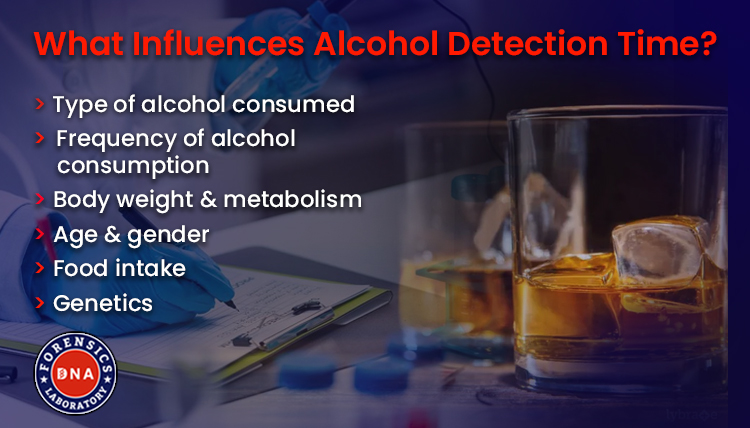Alcohol, a ubiquitous presence in many cultures around the world, holds a complex and often misunderstood place in our lives. While moderate consumption can be a source of social enjoyment and relaxation, the misuse & abuse of alcohol leads to various physical, psychological, and social problems. Alcohol abuse is a critical public health concern that necessitates a closer look, both in terms of understanding its roots and identifying the paths to recovery. If you or someone you care about is concerned about alcohol use, an alcohol detection test can provide valuable insights. In this blog post, we’ll answer the top three questions about alcoholism tests.
Q1: What are Alcohol Detection Tests and their Types?
A1: An alcohol detection test involves the technical analysis of various human biological samples, including blood, urine, sweat, nails, and hair, to determine the presence of alcohol. These tests do not measure the precise quantity of alcohol in the body but rather assess the pattern and frequency of alcohol consumption.
Among the methods available to assess alcohol abuse, the nail & hair alcohol tests stand out as the most effective and reliable options.
- Hair Alcohol Detection Test: This test analyzes a person’s hair strands to detect the presence of ethyl glucuronide (EtG) & fatty acid ethyl esters (FAEEs). These compounds are produced when the body metabolizes alcohol and can be detected in the hair for up to 90 days after alcohol consumption. Hair alcohol testing offers a long-term perspective on a person’s alcohol consumption and is particularly valuable when recent alcohol use is unknown or cannot be determined.
Sample Collection – About 200 hair strands about the thickness of a pencil are collected for Hair Alcohol Testing. While head hairs remain the preferred and conveniently obtainable choice for this type of testing, other bodily hair varieties, such as chest, leg, arm, and beard hairs, can also serve as suitable alternatives.
- Nail Alcohol Detection Test: This test analyzes fingernail or toenail clippings for the presence of EtG. Similar to hair alcohol tests, nail alcohol detection tests provide a long-term view of alcohol consumption. EtG molecules can be detected in nail clippings for up to six months after alcohol consumption. Nail alcohol testing is especially useful when an individual may have shaved their hair or experienced hair loss due to medical treatments.
Sample Collection – If the nail length is 5 mm, a single nail clipping can suffice for the test. For shorter nails, it’s better to take nail clippings of 10 mg (approx.) for a conclusive result. The choice of fingernails or toenails can be made, but a mixture of both is discouraged for accuracy.
Q2: What Influences Alcohol Detection Time?
A2: The detection time for alcohol in the body can vary based on several factors:
- BAC Level – Higher blood alcohol content or BAC levels result in longer detection times. Alcohol may remain in the system for several hours after consumption.
- Metabolism – Individual metabolic rates significantly affect how quickly the body processes alcohol. Faster metabolisms tend to eliminate alcohol more rapidly.
- Frequency of Consumption – Regular alcohol consumption can lead to a buildup in the body, extending the detection window.
- Food Intake – Consuming food before or while drinking alcohol can slow its absorption into the bloodstream, potentially affecting detection times.
- Body Weight – Alcohol tends to be distributed more quickly in individuals with lower body weight, potentially leading to shorter detection times.

Q3: Who Should Take an Alcoholism Test?
A3: The decision to take an alcoholism test can be a proactive step toward better understanding your relationship with alcohol. Here are some situations in which taking an alcoholism test may be appropriate:
- Personal Concerns: If you’re worried about your drinking habits, whether it’s an occasional concern or a persistent one, taking an alcoholism test can help you assess the situation objectively. It’s an essential first step in recognizing potential issues.
- Family and Friends: Concerned family members or friends may encourage their loved ones to take an alcoholism test if they suspect problematic drinking behavior. An objective evaluation can provide clarity and open the door to discussions about seeking help.
- Medical Professionals: Healthcare providers often use alcoholism tests as part of routine health assessments. They may administer these tests to patients who report alcohol-related issues, such as symptoms of liver disease, depression, or other health problems.
- Legal or Occupational Reasons: In some cases, individuals may be required to take an alcoholism test for legal reasons, such as after a DUI (Driving Under the Influence) incident or for occupational purposes, especially in safety-sensitive jobs.
Why Choose Us for Alcohol Testing?
DNA Forensics Laboratory Pvt. Ltd. (DFL) stands as a prominent provider of accredited DNA testing solutions in India. Our services cater to various needs, including drug & alcohol detection tests for Indian citizens at competitive prices. Moreover, we’re the only provider of Legal DNA Testing Services for Indian courts.
Our drug and alcohol tests provide comprehensive insights into substance consumption with a detection window that spans 6 to 12 months. At DFL, we understand that getting tested for alcohol or drugs can be a sensitive issue. That’s why we offer confidential testing services and strict privacy policies to protect our clients’ information.
Our experienced & compassionate team will guide you through the testing process and provide you with accurate results in a timely manner. With 400+ collection centers across India & abroad, you can visit your nearest center to give the samples or call collection agents at the respective address.
Feel free to call us at +91 8010177771 or WhatsApp at +91 9266615552 for any further inquiries about drug & alcohol testing. Together, we can help you take the first step towards a healthier, sober life!
